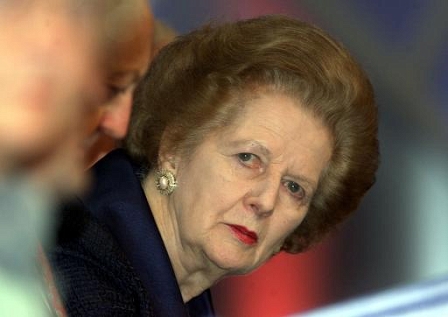Erstellt am: 9. 4. 2013 - 15:59 Uhr
The Iron Will of the Iron Lady
Subscribe to the Reality Check podcast and get the whole programme after the show.
I was at university when Margaret Thatcher first entered 10, Downing Street as Prime Minister. Among my fellow students, feelings were mixed. Along with concerns about how she would shape up at the helm of the country, and dismay among my more left-leaning friends that the country was back in conservative hands, there was also an air of excitement and hope. The first woman in the top elected office in the country, a new precedent and a new era.

EPA PHOTO EPA/GERRY PENNY
It had been a tough few years leading up to her election. The trade unions were wielding enormous power, most importantly, the National Union of Mineworkers. I remember doing my homework, wrapped in blankets, and by candlelight during the notorious "3 day week" when the state of emergency caused by the miners' strike meant on some days we only had electricity for 3 hours at a time.
When we talk about strikes these days, such as anti-austerity strikes, we are usually talking about a strike of a day or two. The strikes in the Britain of the 1970s went on for weeks, even months. While there may have been public sympathy for the miners in principle, there was little sympathy for the way the trade union leaders held a gun to the heads of the government, and in turn the whole country. The mood of the unions was captured, or maybe parodied, in the song that became the trade unions' unofficial anthem "Part of the Union". Whether it was written as a tribute or a parody is open to interpretation, but the idea that strikes were the answer to everything was certainly part of the mantra.
So, it's hardly surprising that there was considerable popular support for Maggie's promise to stand up to the unions - a promise she certainly delivered on.
In some ways, there were many parallels with the situation we find ourselves in today. There was an economic crisis with no easy solution. Cracking the unions and an aggressive policy of privatisation and capitalism was not a path to a promised land of economic prosperity and stability, any more than the previous (Labour) government's socialist policies had been.
The character that made her able to stand up to the unions, also stood her in good stead in handling the IRA's bombing campaign. The mettle she showed in the aftermath of the Brighton bombing, which she only narrowly survived, won praise and admiration from even her greatest critics.

Unknown
However, in the words of Paul Weller, "The public gets what the public wants" and the spirit that broke the unions and stood up to the IRA, was also her downfall in her bullish handling of foreign policy, controversial pro-nuclear defence policy, and domestic disasters such as the Poll Tax. The latter led to massive protests and riots, and eventually toppled her from power.
In today's Reality Check, political analyst, Ivor Gaber, looks at her life and legacy
Dieses Element ist nicht mehr verfügbar
and Jon Savage looks at her impact on popular culture and music
Dieses Element ist nicht mehr verfügbar
Defences against North Korea
Military analyst Paul Beaver explains what types of defences are being deployed against a possible missile strike from North Korea, and their chances of success.
Dieses Element ist nicht mehr verfügbar
Workers' rights in China
Publisher Daniel Fuchs discusses the new book "Arbeitskämpfe und Widerstand in China"
Dieses Element ist nicht mehr verfügbar
Good news on development
Wolfgang Lutz from IIASA explains why progress is being made on achieving the millennium development goals.
Dieses Element ist nicht mehr verfügbar
FM4 Reality Check
Monday to Friday from 12.00 to 14.00, and after the show via Podcast or fm4.orf.at/realitycheck.


